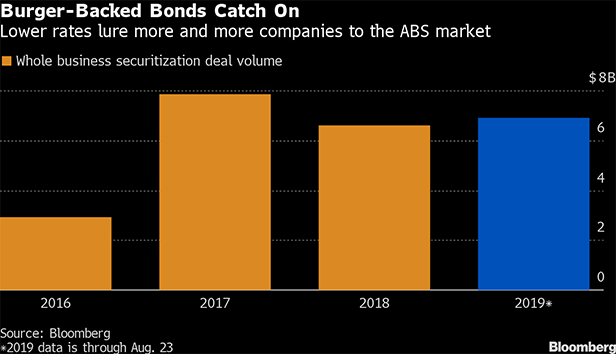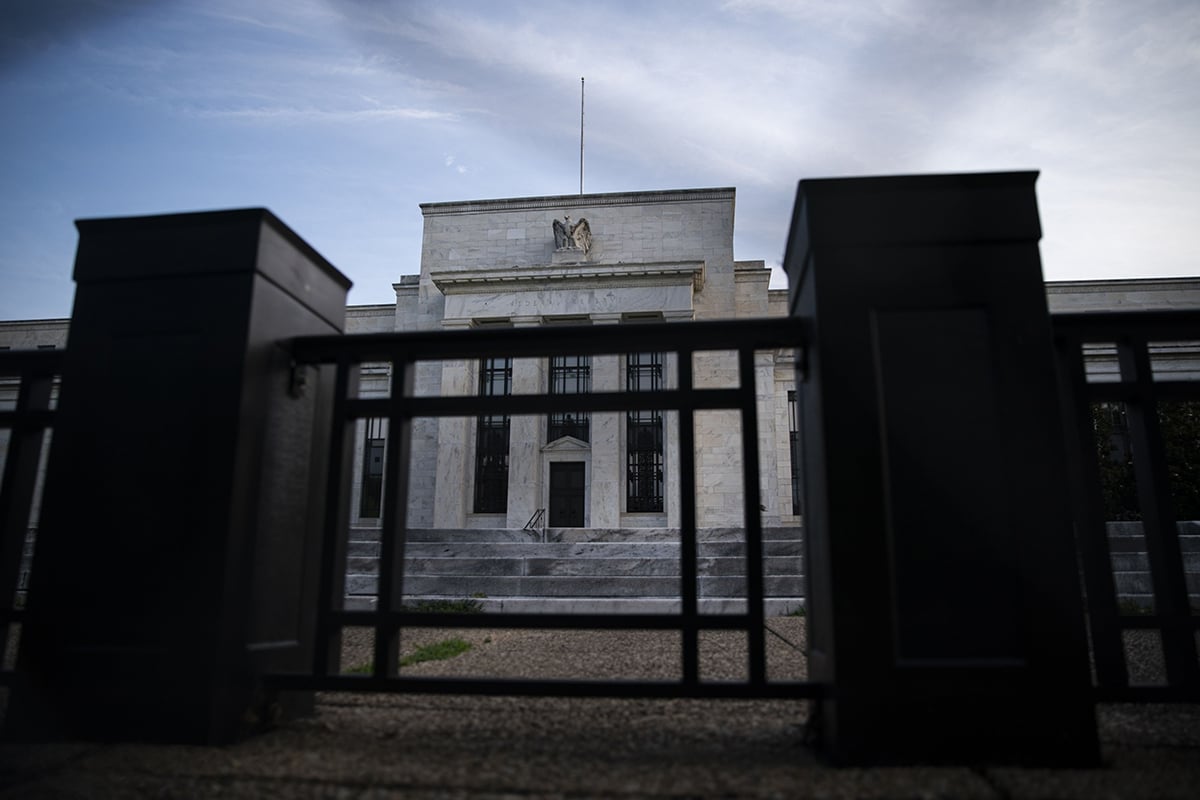As borrowing costs plunge for the highest-quality companies,there's a growing incentive for riskier businesses like fast-foodchains to mortgage virtually all their assets.
|Franchised companies like burger restaurant Jack in the Box Inc.and massage provider Massage Envy are increasingly selling unusualbonds backed by most of their business. By pledging key assets likeroyalties, fees, and intellectual property to bondholders,companies can win investment-grade credit ratings on their debt andslash their financing costs, making their bonds higher quality evenif their overall companies are still relatively risky.
|This year borrowers have sold more than $6.9 billion of thesesecurities, known as whole-business securitizations, approachingthe most on record, according to data compiled by Bloomberg.Fast-food restaurants used to be the main issuers of this debt, buta wider array of companies are now jumping in. This year, inaddition to Massage Envy, a group of preschools and a distributorof music royalties have sold the bonds.
|"The sector is growing very fast," said Tracy Chen, who investsin whole-business bonds as head of structured products at $75billion asset manager Brandywine Global. "You can almost securitizeanything."
|
Companies are being nudged toward this kind of financing by bondinvestors that are gravitating toward relatively safe securitiesand away from the riskiest debt in the junk-bond market. They'relooking for an elusive combinationof safety and strong returns in a world that has more than $16trillion of negative-yielding debt. That's translating tomaterial savings for corporations that can shift from high-yieldborrowings to investment-grade.
|For example, Wendy's Co. sold $850 million of whole-businessbonds yielding between 3.78 percent and 4.08 percent in June, whichare likely to be refinanced in seven to 10 years. Those bonds wonthe second-lowest investment grade. A smaller unsecured bond thatthe company sold in 1995, due in 2025 and rated seven steps belowinvestment grade, yielded around 5.3 percent in June. Reducinginterest payments by around 1.5 percentage points annually on $850million of debt can translate to a savings of $12.75 million a yearbefore taxes.
|"The cash interest savings is certainly very attractive," saidKate Jaspon, CFO of Dunkin' Brands Group Inc., which refinanced itsdebt in a $1.85 billion transaction this year. "The securitizationmarket has allowed us to access an investment-grade market whichhas been more stable over the years compared to a leveraged-loan orhigh-yield market."
| Whole-business bonds alsotypically allow companies more flexibility in managing theirfinances than conventional high-yield bonds or leveraged loans. Forexample, investor protections on some types of junk bonds mightrequire a company to devote some of its cash flow to debtreduction. But the Dunkin' whole business bonds have not, whichfrees up the company to spend the cash on dividends to shareholdersor buybacks, Jaspon said.
Whole-business bonds alsotypically allow companies more flexibility in managing theirfinances than conventional high-yield bonds or leveraged loans. Forexample, investor protections on some types of junk bonds mightrequire a company to devote some of its cash flow to debtreduction. But the Dunkin' whole business bonds have not, whichfrees up the company to spend the cash on dividends to shareholdersor buybacks, Jaspon said.
As the market has grown—there's about $26 billion outstandingnow, according to Kroll—not all deals have done well. Retailer PetSupplies Plus scrapped a planned $330 million offering earlier thismonth, citing market conditions. Kroll downgraded a deal backed byTGI Fridays franchise agreements, citing the chain's decliningsales since the debt was issued in 2017. It's not clear how some ofthese businesses will perform in a downturn, said Brandywine'sChen. She is sticking with whole-business securitizations fromfast-food companies, which tend to perform well in recessions.
|The potential savings from borrowing with whole-business bondshas been increasing as concern over the U.S.-China trade war andslowing global growth boost demand for investment-grade notesrelative to riskier junk debt. Total returns on high-grade debt areabout 13.6 percent this year, compared with around 10.6 percent forhigh-yield. A bond in the B-rated tier of speculative grade yields,on average, 2.85 percent more than a BBB security, up from about 2percent a year ago.
|In a typical security, a company with stable cash flows and aheavily franchised business model pledges assets like royaltiesinto a special entity that is immune from the bankruptcy of theparent company. The money generated from that unit can fundbusiness operations and pay investors. Additional protections, likestipulations that divert cash to pay investors if business goessouth, can elevate the securities to investment-grade ratings.
|Companies benefit from selling whole-business bonds, but moneymanagers gain too: They get higher yields than they would earn fromrun-of-the-mill investment-grade corporate bonds because theasset-backed securities are more complicatedand take more time to analyze. The asset-backed notes are oftenrated in the BBB tier, among the lowest ratings for high-gradebonds.
|An offering this month backed by the rights to play music fromartists like Bob Dylan paid a 5.2 percent yield, while preschoolchain Primrose Schools sold a bond that yielded 4.48 percent. Inthe unsecured bond market, the average BBB bond pays 3.2percent.
|"When you start to look at BBB-rated whole business versus a BBBunsecured issue, it can look compelling," said Philip Armstrong, aportfolio manager for structured investments at Invesco, whichoversees $1.2 trillion. "There's definitely considerable yieldpickup."
|Higher yields have helped draw into the asset-backed market someinvestors that mainly focus on corporate debt. That broader demandhas made the securities easier to trade, said Dave Goodson, head ofsecuritized fixed income at Voya Investment Management, whichoversees $220 billion.
|"It emboldens issuers to come to this market," Goodson said."Core buyers who have always been buyers have started to appreciatethe better liquidity."
||
Copyright 2019 Bloomberg. All rightsreserved. This material may not be published, broadcast, rewritten,or redistributed.
Complete your profile to continue reading and get FREE access to Treasury & Risk, part of your ALM digital membership.
Your access to unlimited Treasury & Risk content isn’t changing.
Once you are an ALM digital member, you’ll receive:
- Critical Treasury & Risk information including in-depth analysis of treasury and finance best practices, case studies with corporate innovators, informative newsletters, educational webcasts and videos, and resources from industry leaders.
- Exclusive discounts on ALM and Treasury & Risk events.
- Access to other award-winning ALM websites including PropertyCasualty360.com and Law.com.
*May exclude premium content
Already have an account? Sign In
© 2024 ALM Global, LLC, All Rights Reserved. Request academic re-use from www.copyright.com. All other uses, submit a request to [email protected]. For more information visit Asset & Logo Licensing.








